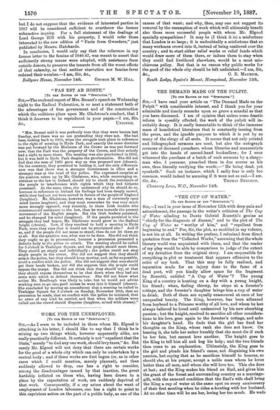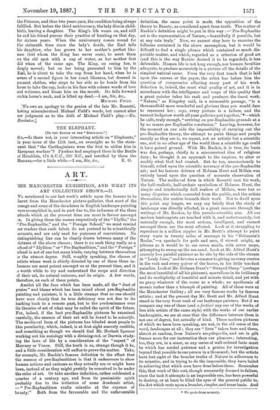"THE CUP OF WATER."
[To FHB BDITOR OF THE "SPECTATOR."] Ste, —I read in your issue of November 12th with deep pain and' astonishment, the passage in the writer's criticism of The Cup of Water alluding to Dante Gabriel Rossetti's genius as " chiefly for the diagnosis of disease," and to the plot of The Cup of 1Vater as " worthy, of him," and " repellent from beginning to end." For, Sir, the plot, as modified in my volume, is not his at alL In writing the preface, I refrained from direct quotation from the "Collected Works," assuming that the whole literary world was acquainted with them, and that the reader of my play would be able by comparison to judge of the extent of my deviation from the original story. I am responsible for everything in plot or treatment that appears offensive to the critic of my book. That this may be fully realised, and reparation made for an injury done to the fame of a dead poet, will you kindly allow space for the fragment by Rossetti, entitled "A Cup of Water "I' The young King of a country is hunting on a day with a young knight, his friend; when, feeling thirsty, he stops at a forester's cottage, and the forester's daughter brings him a cup of water to drink. Both of them are equally enamoured at once of her unequalled beauty. The King, however, has been affianced from boyhood to a Princess worthy of all love, and whom he has always believed he loved until undeceived by his new absorbing passion ; but the knight, resolved to sacrifice all other considera- tions to his love, goes again to the forester's cottage, and asks his daughter's hand. He finds that the girl has fixed her thoughts on the King, whose rank she does not know. On hearing it, she tells her suitor humbly that she must die if such be her fate, but cannot love another. The knight goes to the King to tell him all and beg his help; and the two friends then come to an explanation. Ultimately, the Bing goes to the girl and pleads his friend's cause, not disguising his own passion, but saying that as he sacrifices himself to honour, so should she, at his prayer, accept a noble man whom he loves better than all men, and whom she will love too. This she does at last; and the King makes his friend an Earl, and gives him the grant of the forest and surrounding country as a marriage- gift, with the annexed condition that the Earl's wife shall bring the King a cup of water at the same spot on every anniversary of their first meeting when he rides a-hunting with her husband. At no other time will he see her, loving her too much. He weda
the Princess, and thus two years pass, the condition being always fulfilled. But before the third anhivereary, the lady dies in child- birth, leaving a daughter. The King's life wears on, and still he and his friend pursue their practice of hunting on that day, for sixteen years. When the anniversary comes round for the sixteenth time since the lady's death, the Earl tells his daughter, who has grown to her mother's perfect like- ness (bat whom the King has never seen), to meet them on the old spot with a cup of water, as her mother first did when of the same age. The King, on seeing her, is desply moved; but on her being presented to him by the Earl, he is about to take the cup from her hand, when he is aware of a second figure in her exact likeness, but dressed in peasant clothes, who steps to her side as he bends from his hove to take the cup, looks in his face with solemn words of love ant welcome, and kisses him on the month. He falls forward onhis horse's neck, and is lifted up dead..—I am, Sir, &c.,
MICHAEL Frau).
'7e owe an apology to the genius of the late Mr. Rossetti, having misunderstood Michael Field's words, but cannot alter ow judgment as to the drift of Michael Field's play.—En. Spectator.]
























































 Previous page
Previous page